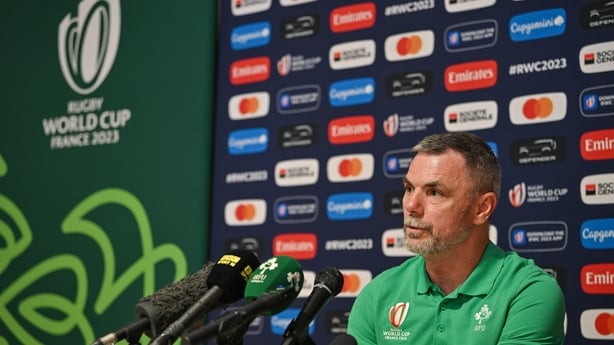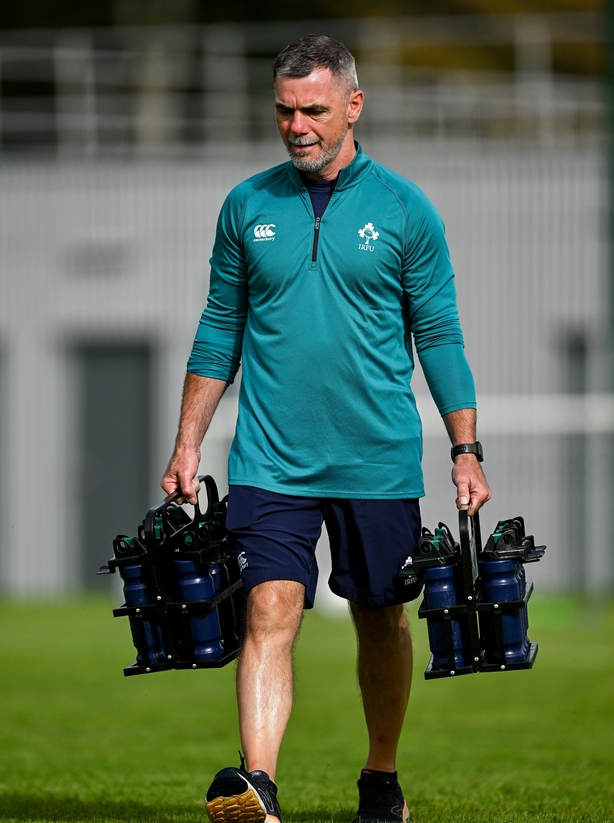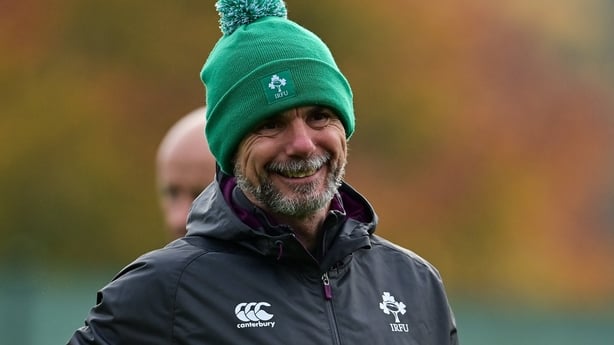Gary Keegan works behind the scenes.
In fact, the IRFU's performance coach is not even on their 'management' profile page on the website.
He previously worked with Ireland's elite boxers, and with Jim Gavin and Liam Sheedy.
Chosen by Andy Farrell, Keegan is seen as a central tenet of the team's success.
The Dubliner sat down with the assembled media in Tours yesterday for a lengthy chat about his work.
Tell us about your role?
My role is as performance coach, with my primary responsibility around the playing group and then the players as individuals. But I also support any member of staff or management that needs support along the way.
So anything around maximising their performance from a mental perspective, planning their daily diaries, their schedules, building strategies around their mental game etcetera, all those aspects.
We meet players one-to-one on a daily basis and we prepare for them as a group so that we have that collective connection to what we're doing and then we go back to the individual support work.
Tell us about the origin of your involvement in this team, when you first crossed paths with Andy Farrell?
"Well, I'd been on the Professional Games Board within the IRFU so there was an awareness that I was around the space.
"I had done two years with Leinster Rugby in '17 and '18, so when Andy came into the role I hadn't met him prior to him coming into the role and he was probably eight or nine months, maybe a year into the role before we had a conversation.
"And we just met and just had a chat and talked about all things performance and environment and high performance and that stuff, and he asked about my career and what I was doing, and we just shared stories and that was it, I didn't hear any more back.
"That was it, I didn't hear anything back.
"A lot of it was also about who would fill a role like this for this team in the future and he gave it a lot of thought, reflected on it for a lot of time before he decided on who he wanted. "He reached out, we had a conversation and he asked me to come on board for two days a week.
"We quickly discovered that that wasn't going to do it because you have to be fully immersed, you have to integrate yourself with the language and what it is that rugby is.
"It's quite a complicated sport. It's not like Gaelic football, there's a lot more to learn.
"So, yeah, he asked me would I come on board and I did. Two days worked landed well with the group and then it became full-time."
How much of it is rugby specific?

It's very rugby specific because that's the context. Trying to understand the context and navigate it really well so that your content is relevant to where we're at at any particular stage in the tournament or campaign.
It's very rugby driven. It has to land well with this group, it has to make a difference, it has to have meaning for them if they're going to be able to apply it in the context of their performance on the field or in the context of how they prepare for a game.
It's not for everyone, how much buy-in is there? Is everyone involved?
This is a professional group. They're very professional individuals. But they're also a very curious group so there's no compulsory 'you have to attend the meeting’, the options are left for the players to decide.
Some players would be very regular, some players will have four check-ins over a campaign because they're managing very well, they're very well organised in terms of their day-to-day and their weekly plan.
But at a group level, we get to touch everybody. That's why it works for us. We have that collective piece that's aligned to what the coaches are trying to get across and then that pulls a few players in and then we have our one-to-one piece.
But I'd say we have 70% of our players who are fully engaged and tapping in. Those who aren't have their own processes in place.
Have you noticed a change in confidence and self-belief of players?
A lot of it is led by Andy [Farrell's] leadership. I think the person at the forefront of the group, it's important that he has a very clear sense of what he's trying to achieve and he's a very clear sense of where he wants to take the team.
And it doesn't happen overnight. It's taken three-plus years to build the environment and build the belief in the group in terms of what we're collectively trying to achieve and he's been consistent and constant in his approach to that and I think we all take our lead off how he's leading and managing the environment.
How do you break that barrier regarding Ireland World Cup quarter-final record?
It takes a leader who wants to do that. It takes a leader who has the confidence in himself to want to break the mould and to want to reach for the stars. Because if he's not convinced that it can be achieved, it's very hard to convince everybody else that it can be achieved.
Is Andy convinced?
"Yes, he's 100% convinced. That doesn't mean there's any guarantees in terms of where you end up. It's about how and it's about what we do, and it's about how we respond to difficulties as we face them.
We're not expecting the paths to be clear or easy. It's not meant to be because it wouldn't be worthwhile if it was. My career has been involved in breaking moulds, that's an exciting thing to be part of and I think we have that within this group, for sure.
Is this a unique challenge, to be successful at a Rugby World Cup which takes place over such a long time?

"Well, we certainly get that from the Olympic space. We not only have a long campaign into the Olympic Games, we have four years in which we're preparing and trying to bring athletes through to get them to that level.
"But the World Cup in the context of rugby is a longer campaign than any other campaign that they have, so I think the earlier you start to think about it and focus on it the better prepared you are when you come to the tournament itself.
"This team have been preparing for this World Cup for quite some time, so we have a very clear sense of what's ahead of us and how to manage it.
"I think that you have got to stay in the day that you are in, not try and swallow the whole tournament in one go, we take it step by step. It's kind of a next-game focus, next-training focus, that type of stuff.
"So I think that's how we've handled it.
Does Andy Farrell use you in your professional capacity?
"We bounce off each other and the coaching team, you're there to give a little bit of feedback every now and then when you're asked but it's important that I'm aligned to what he's trying to achieve and he's very clear on what he's looking for, which makes my job much easier because I can create on the basis of that.
"So I think that relationship is very important in terms of my role but also the relationship with the rest of the coaching team is very important also.
What development have you seen in the team over the course of the last two very successful years?
"I think the group has always had that potential, there's a lot of talent in this group.
"I think one of the big changes is the empowerment that Andy provides to those players and the level of ownership and leadership they are providing for their peers has been a big difference, and I think there's a very significant buy-in to what we're trying to achieve and a belief in how we're trying to achieve it.
"I think that's been a big difference.
There’s a big focus on Ireland’s World Cup record, is that something you challenge the players head on with or talk about it as a new era rather than focusing on the past?
"We don't really....we're not bothered by it, I think this group wear that skin very well. It's not normally in the Irish mentality but if you're there, you've earned the right.
"But there's a recognition across this entire group, including staff, that we have to continue to earn the right, nothing is going to be given to us and every new performance has to be generated and created, we can't live off a past performance.
"So I think that's the attitude, there's a curiosity about how we can improve as a group, it's there across all roles within the group, not just the playing group; the coaching group, our whole performance support group and our operations group is the same, how can we improve and how can we innovate as a group.
"So keep grounded and stay curious.
How can you stay grounded as the world's number one team?
"Because the Irish never get ahead of themselves. As a nation we are grounded, we're hard working and I think that has served us really well.
"You've got to respect what's in front of you because if you don't it's going to teach you a lesson. And we drive that message into this group, we've got to respect what we face next and we've also got to accept the conditions that a tournament like this will throw at us, and I think that is why the group have become quite adaptive over the last number of years.
It was felt that ‘performance anxiety’ affected the team in 2019 and there was talk about going into their shell against France in 2020, what did you find in the group in that year, Andy’s first?

"I didn't feel a lot of that in the environment, he'd done a lot of that work himself with the group and he was getting them to a tipping point where they were ready to tip over the line.
"Him and his coaching team had them in a very good position.
"There's always a danger that we'll carry the memory, the trauma of a previous experience into a similar experience in four years' time. "This group has gone beyond that and due credit to the players, they've opened themselves up.
"They've had an opportunity to access new tools, new thinking, new strategies and they've gone about implementing that into their practice on a more daily and weekly basis.
"It's a different group because it's a different environment under a different leader."
How does Andy match up to other leaders like [former Dublin football manager] Jim Gavin, [former Tipperary hurling coach] Liam Sheedy [boxing coach] Billy Walsh?
"The common trend for the best one is the responsibility they take for the people they have around them, their staff, their playing group.
"Recognising their role as leaders is to serve and I think that's one common theme that I've seen in the best managers or head coaches that I've worked with.
"I've been lucky to choose the right people to work with, genuinely.
"There's some people I wouldn't work with.
"The best people I've worked with have a philosophy that aligns to my own and they have a view on what environment should be, what the structure should be around not only their playing group, but their staff group and that's something Andy has in common with others I've worked with."
Is performance anxiety something you've to keep on top of?
"You have to stay on top of it every day.
"I mean, I don't like the term because you can have a little bit of negative thinking that comes into a little bit of worry about something small, it gets bigger and then all of a sudden it looks like anxiety.
"You have to wash it out every day.
"Every player does, every coach does because we're stepping out of our comfort zone.
"That's where we want to be, that's where our potential is.
"There's going to be a bit of discomfort out of that, so we try to normalise that and not hide in its shadow, we try not have a meeting in secret.
"It's very open, the environment is very open and we're open to discussing these things.
"It's not bad news to have a bit of performance anxiety, it's part of the process.
"It's how you manage yourself, you reach out and are proactive about it that makes the difference.
"And I think that normalisation has really helped people.
"But we'll have things to prepare for this week and the following week, it never really goes away."
Is there a difference between individual athletes and team athletes?
"Yes. Individual athletes are a bit like entrepreneurs, they’re out there on their own. It’s them and their coach and maybe their support team, they’re accountable to themselves and they have to go out and produce their own performance.
"Whereas we are a collective. We’re a unit and a team and we have to build relationships. We have to build connections.
"We have to learn the game together and we have to go out of our comfort zone to go into different personalities and different relationships and build them, especially given these are coming from four teams that compete against each other.
"I think that’s quite astonishing, what these guys have managed to achieve but it’s very different.
"In a team environment the relationships are absolutely critical and the connections that these guys can drive so that they can depend on each other when times are tough on the field. So it’s very different."
Every rugby match is essentially a fight. What are the similarities between boxers and rugby players?
"I will not speak as an expert on this but it is a collision game.
"There’s a sense and a feeling we prepare for combat and, yeah, it’s 15 against 15, physicality is massive and yet not unlike boxing you need a lot of technical skill, you need to understand a lot about the game to be able to play it exceptionally well.
"And boxers are no different. Sometimes we write off boxers as potentially lacking intelligence but they’re very intelligent people.
"The skill of the game from a technical perspective is pretty high and the tactical element of the game is also very significant.
"But I’ve been amazed by what these guys have to take in from a rugby perspective, in terms of what they have to learn week on week but yeah, there are similarities between the two sports."
What specific traits does this group have that can make them world champions?
"I think apart from how we play the game, apart from the skill-set that this group have from one to 15, it’s potentially our ability to adapt, to not expect things to go smoothly, to have the resolve.
"The road can be rocky at times but there’s no need to panic, just get on with it, things happen, just get on with it. I think they’ve built that mentality over the last three and a half years and hopefully it continues to serve us well in this tournament."
How do you build that? Stressed situations?
"Well, the competition manufactures situations for you because it’s pitching against some of the best teams and best players in the world who are trying to find a way to beat you. You’re trying to find a way to beat them.
"That creates adversity in itself. The way we train, the way we push ourselves, the way were going out of our own comfort zone all the time is creating adversity because we can’t grow in the sunshine. We have to grow under difficult conditions.
"Those difficult conditions are structured and organised but they’re set to harden what we have as a team, not only physically but mentally."
Listen to the RTÉ Rugby podcast on Apple Podcasts, Spotify or wherever you get your podcasts.
Watch live coverage of Ireland v Tonga (Saturday, 8pm) on RTÉ2 and RTÉ Player, listen to live commentary on RTÉ Radio 1, and follow live updates on RTÉ Sport Online and the RTÉ News app.


